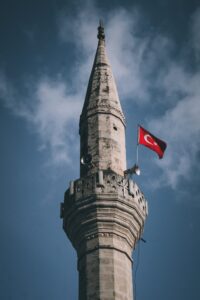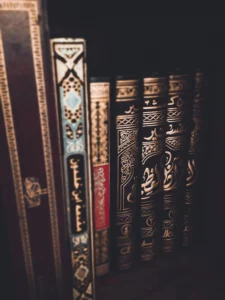Our November 2022 colloquium featured Yahya Birt, who presented on his latest report from the Ayaan Institute, Ummah at the Margins: The Past Present and Future of Muslim Minorities. The report argues that strategies to enhance the freedoms and prosperity of Muslim minorities have often been overshadowed by interstate rivalries in the Muslim majority world, which sees these minorities as either national assets or liabilities. Nonetheless, Muslim minorities have strong soft power potential which could revitalize Islamic civilization, provided that umma solidarity is nurtured in ethical terms rather than neutered in service to religious nationalisms.
You can read the Ayaan report here.
Yahya Birt is a Research Director at Ayaan Institute and has twenty years of experience in public policy engagement over British Muslim affairs at community, national and international levels. He is the author of The Collected Poems of Abdullah Quilliam (2021) and has has written a dozen peer-reviewed academic articles on aspects of Muslim life and history in Britain.
Linda Hyökki (PhD Candidate at Ibn Haldun University, Istanbul), Dr. Fatima Rajina (Research Fellow at De Montfort University) and Dr. Sadek Hamid (Author of “British Muslims: New Directions in Islamic Thought, Creativity and Activism”) responded, followed as usual by open floor discussion.
“Ummah at the Margins: The Past, Present, and Future of Muslim Minorities Summary”:
Report by Ibrahim Moiz
Although Muslim minorities constitute two-ninths of the global Muslim population, they remain understudied in questions of Islamic internationalism. In his paper, “Ummah at the Margins,” Yahya Birt of the Ayaan Institute considers practical recommendations on how this sizable minority fits into the politics of the Umma. Birt analyzes the ethical responsibilities of minority Muslims outside of “Darul-Islam” and elaborates on the rights and obligations they have toward their local communities and the international Muslim community.
Minority Muslim communities are mostly concentrated in three key areas. The first group are the historical Muslim communities of Russia, India, and China which have been established for centuries but now face pressure from their governments. The second group is part of the “Africa Fourteen”—Muslim minorities that enjoy considerable levels of religious freedom and, in some cases, prosperity on the African continent. Finally, there are Muslims in the “Western Nine,” which include those in the democratic countries of European and North America who tend to have a disproportionate influence on the international scene but also face pressures to conform or assimilate. Contrary to popular belief, the social freedom enjoyed in these countries has little correlation with religious freedom, which must be actively pursued.
It is, therefore, important to have a strategy whereby Muslim minorities can not only survive but also thrive within their local communities and as part of the Muslim Umma. On a theoretical level, the Quranic exhortation to justice and brotherhood offers eternal values to which Muslims must hold themselves while pursuing this project. The Medinah Pact of the Prophet Muhammad ﷺ also offers an excellent model of coexistence with non-Muslims under the authority of Islam. The Umma offers an intriguing internationalist alternative to the status quo of nation-states, which has already been weakened by globalization and leaps in communications technology.
How, then, can Muslim minorities play their part in such an internationalist project? Muslim minorities must strive to protect democracy (in those countries it exists) from the grip of oligarchy and corporatocracy––factors that tend to turn the democratic system against their interests. They must also strive for a pluralistic society without forgoing their Islamic principles and Muslim identity. With racism continuing to pose a major problem, the strong link between racism and hostility to Islam must be emphasized, and guarantees must be sought for the protection of Muslim minorities.
Muslim minorities have more power than is commonly believed; they exercise soft power by simply behaving according to Islamic principles and possess important forms of hard power too. Muslim diasporas have long shown independent economic initiative. Through remittances, for example, Muslim minorities have conferred significant financial streams to the Muslim world. The same dynamics can be used for specific political work that serves their interests. Avenues that can be explored include building international links and championing local concerns to the Umma at large, thus promoting long-neglected media and cultural projects and fostering independent spaces where Muslims can promote Islamic solutions for the common good.
Responses
Hyökki was concerned with how ambitious internationalist projects can be pursued when Muslim communities are internally divided, with one part often played off or permitting itself to be played off against another. The Tatars of Finland, for instance, are often contrasted against other Finnish Muslims. This point was supported by Dr. Ovamir Anjum, who observed that other Muslim communities in the United States often inadvertently exclude African-American Muslims in expensive and elitist conferences. Additionally, Hyökki emphasized that local Muslim urf, or custom, can vary greatly and serve as a barrier to internationalism. The question then becomes: how can we translate local particularisms to international linkages?
Birt: Muslims can take local issues, for example, in France, to an international forum for support. The shariah’s recognition of urf supports diversity within the broader ummah, and thus such localized variances need not clash with international Muslim support.
Rajina appreciated the report’s optimism, attention to neglected segments of the Umma, and focus on activism and public ethics based on Islamic values rather than the state or secular ideologies. She cautioned against reproducing in Muslim activism the same problematic trends that modernity and colonialism have triggered in the Muslim world, such as racial hierarchies. The relative decline of Western hegemony does not mean the decline of its ideology, which is often internalized in non-Western communities and institutions.
Birt: We need to constantly check our activity against normative Islamic sources (the Quran and Sunnah) in order to avoid internalizing the ideological currents or reproducing the structures we are trying to escape.
Hamid was also heartened by the report’s optimism and, in particular, its practical recommendations but wondered how Muslims could be shaken out of the pessimism and apathy often triggered by selective usage of Ummatic sentiment.
Birt: We need to confront the “misuse of the Umma” when and where we find it.
Further Questions by Panelists
Dr. Hafsa Kanjwal: In addressing the question of Muslim minorities in different countries, how can we overcome the state repression and domestication of Islam, particularly since September 2001?
Birt: Treating Muslim minorities as minorities is not an aspirational or ideological treatment but a recognition of the current state of affairs. The domestication of Islam has largely failed to extinguish Ummatic sentiment, and international linkages remain, especially with the internet. More international exchanges—for instance, through universities or youth exchange programs—are needed, and political tact is needed to avoid repression.
Dr. Ovamir Anjum: Given the cultural clout and international influence of the West, does a focus on Muslim minorities not run the risk of internationalizing their specific brand of Islam as an indirect instrument of imperialism? For example, a reference to Abdullah bin-Bayyah by American leader Barack Obama catapulted the Mauritanian scholar to international fame and enabled him to form close links in and influence Muslim-majority countries. The focus on internationalism risks removing the territorial aspect of Darul-Islam, which has strong jurisprudential implications. Historically, Darul-Islam and its Muslims have always taken precedence in fiqh.
Birt: Since the Ummah is a collective, it cannot cut off Muslim minorities; neither minority nor majority Muslims should be privileged. Perhaps provocatively, colonialism and globalization might require a revisit of the exact boundaries of Darul-Islam.
Themes
Promise and peril: That Muslim minorities form a large, important, and largely unrepresented part of the Ummatic body is undeniable, as is the potential of an Ummatic project that incorporates them. A vitalized Muslim Umma is not only good for Muslims but also non-Muslims; it is a very potent form of internationalism. However, internationalist solidarity must be pursued carefully. There is a risk of internalizing non-Muslim, Western concepts with a Muslim face. Racial hierarchies, statism, nationalism, and gender discourses among Muslims are examples of how well-intended Muslim projects often internalize the presumptions and structures of the very same non-Muslim forces whose control they seek to escape (Kemalism is a particularly notorious case). Another risk is the radical “extraterritorialism” of Darul-Islam to the extent that would push Muslim government, an important part of traditional Islamic law, to the margins. Traditional conceptions of Darul-Islam may require revisiting, but it has always been significant in Islamic law, and new scholarly production is required on this front. A related risk is that Islam is sloganeered and secularized in the same way as “workers of the world.” To avoid these risks, constant self-critique and reference to Quran, Sunnah, and Islamic scholarship is required.
Global or Local: Muslim communities, and in particular Muslim minorities, face considerable challenges: internecine competition, sectarianism, state attempts at domestication, and natural local variances that have always been recognized in Islamic jurisprudence. Though specific situations vary, a tactful and careful linkage of Muslim minorities with other Muslim communities cannot hurt the cause of such minorities. Thus, they must “think global, act local.” Local variances must be accommodated while fitting them into the equation of a broader Umma that can in turn support them. This is a daunting challenge but one rich with potential.



